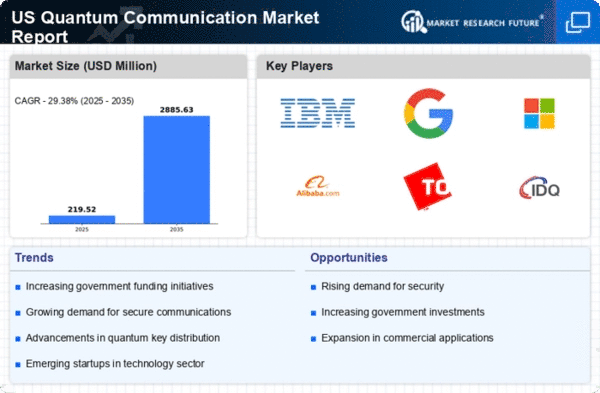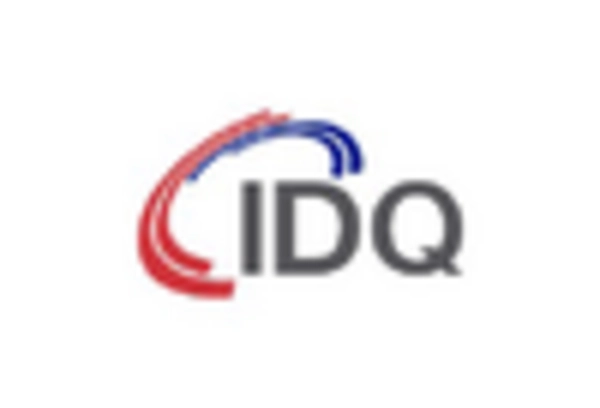Rising Threats to Data Security
The escalating threats to data security are propelling the demand for quantum communication solutions. With cyberattacks becoming more sophisticated, organizations are seeking advanced security measures to protect their data. Quantum communication offers unparalleled security through quantum key distribution, which ensures that any attempt to intercept communication is detectable. In the US, the cybersecurity market is projected to reach $300 billion by 2026, highlighting the urgent need for secure communication methods. This growing concern for data integrity and confidentiality is likely to drive the quantum communication market, as businesses prioritize investments in secure communication technologies.
Advancements in Quantum Computing
The rapid advancements in quantum computing technology are driving the quantum communication market. As quantum computers become more powerful, they necessitate secure communication channels to protect sensitive data. The integration of quantum communication systems with quantum computing is expected to enhance data security, making it a critical component for industries such as finance and healthcare. In the US, investments in quantum computing are projected to reach $1.7 billion by 2026, indicating a robust growth trajectory. This synergy between quantum computing and communication technologies is likely to create new opportunities for innovation and development within the quantum communication market.
Growing Interest in Quantum Networking
The increasing interest in quantum networking is a key driver for the quantum communication market. As organizations explore the potential of quantum networks for secure communication, the demand for related technologies is likely to rise. Quantum networking enables the transmission of quantum information over long distances, which is essential for applications in secure communications and distributed quantum computing. In the US, investments in quantum networking initiatives are expected to exceed $500 million by 2025, reflecting the growing recognition of its importance. This trend is likely to stimulate advancements in the quantum communication market, paving the way for innovative solutions.
Regulatory Support for Quantum Technologies
Regulatory frameworks in the US are increasingly recognizing the importance of quantum technologies, including quantum communication. Government initiatives aimed at fostering research and development in quantum technologies are likely to bolster the market. For instance, the National Quantum Initiative Act, enacted in 2018, aims to accelerate quantum research and development. This regulatory support is expected to enhance collaboration between academia and industry, driving innovation in the quantum communication market. As a result, the market is anticipated to grow at a CAGR of 25% from 2025 to 2030, reflecting the positive impact of regulatory measures.
Increased Collaboration in Research and Development
Collaboration between academic institutions and private enterprises is fostering innovation in the quantum communication market. Research partnerships are essential for developing new technologies and applications that can enhance quantum communication systems. In the US, numerous universities are establishing dedicated quantum research centers, which are likely to attract funding and talent. This collaborative environment is expected to accelerate the development of practical quantum communication solutions, making them more accessible to various industries. As a result, the market may experience significant growth, with projections indicating a potential market size of $10 billion by 2030.
















